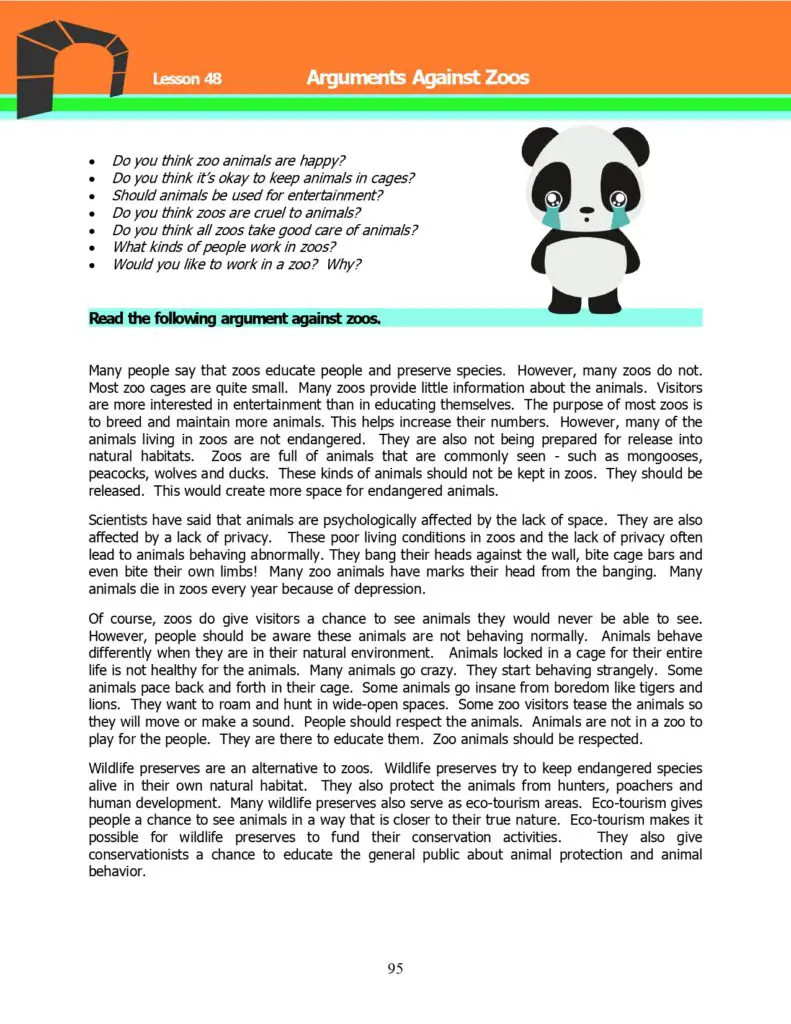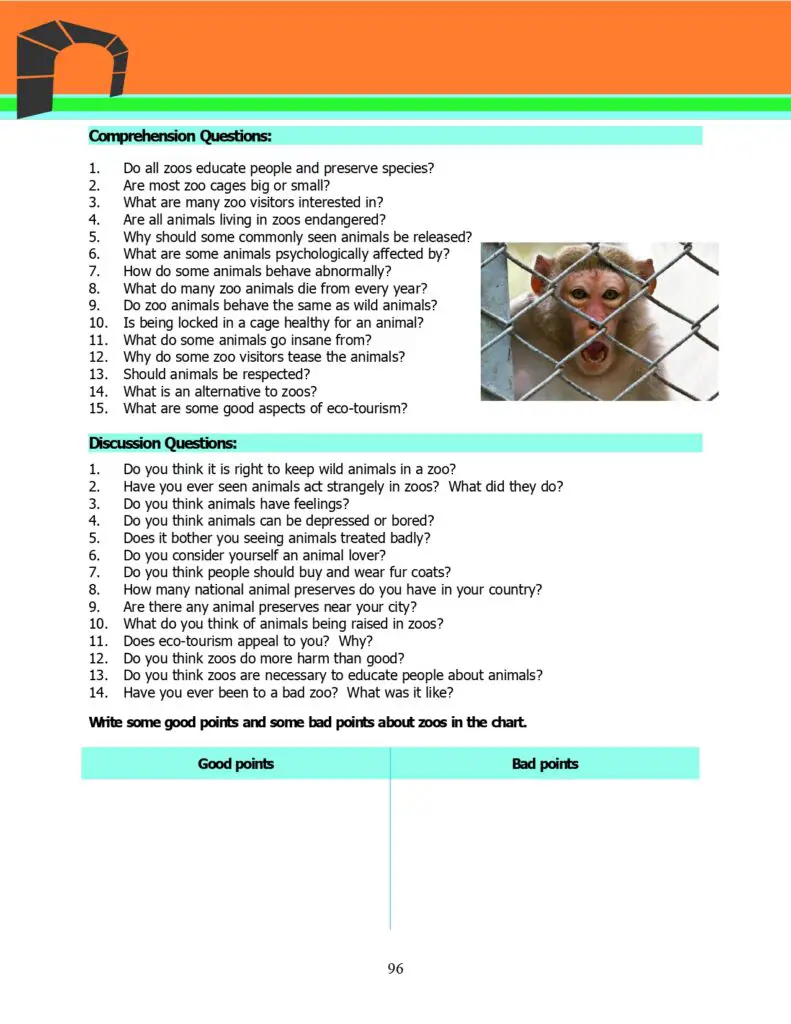This is Lesson 48, “Arguments Against Zoos,” from our book of 48 advanced adult ESL lessons, ESL Pathways: Frontiers. This adult ESL lesson features an argument against zoos, followed by comprehension questions, discussion questions, and an activity for students to list the good points and bad points of zoos. This content-packed adult ESL lesson is useful for helping more advanced English learners refine and improve their English fluency. This lesson is available for free download, and you can download many other ESL lessons for adults like this one in our book ESL Pathways: Frontiers.


ADULT ESL LESSONS: Arguments Against Zoos (Text-Only Version)
- Do you think zoo animals are happy?
- Do you think it’s okay to keep animals in cages?
- Should animals be used for entertainment?
- Do you think zoos are cruel to animals?
- Do you think all zoos take good care of animals?
- What kinds of people work in zoos?
- Would you like to work in a zoo? Why?
Read the following argument against zoos.
Many people say that zoos educate people and preserve species. However, many zoos do not. Most zoo cages are quite small. Many zoos provide little information about the animals. Visitors are more interested in entertainment than in educating themselves. The purpose of most zoos is to breed and maintain more animals. This helps increase their numbers. However, many of the animals living in zoos are not endangered. They are also not being prepared for release into natural habitats. Zoos are full of animals that are commonly seen – such as mongooses, peacocks, wolves and ducks. These kinds of animals should not be kept in zoos. They should be released. This would create more space for endangered animals.
Scientists have said that animals are psychologically affected by the lack of space. They are also affected by a lack of privacy. These poor living conditions in zoos and the lack of privacy often lead to animals behaving abnormally. They bang their heads against the wall, bite cage bars and even bite their own limbs! Many zoo animals have marks their head from the banging. Many animals die in zoos every year because of depression.
Of course, zoos do give visitors a chance to see animals they would never be able to see. However, people should be aware these animals are not behaving normally. Animals behave differently when they are in their natural environment. Animals locked in a cage for their entire life is not healthy for the animals. Many animals go crazy. They start behaving strangely. Some animals pace back and forth in their cage. Some animals go insane from boredom like tigers and lions. They want to roam and hunt in wide-open spaces. Some zoo visitors tease the animals so they will move or make a sound. People should respect the animals. Animals are not in a zoo to play for the people. They are there to educate them. Zoo animals should be respected.
Wildlife preserves are an alternative to zoos. Wildlife preserves try to keep endangered species alive in their own natural habitat. They also protect the animals from hunters, poachers and human development. Many wildlife preserves also serve as eco-tourism areas. Eco-tourism gives people a chance to see animals in a way that is closer to their true nature. Eco-tourism makes it possible for wildlife preserves to fund their conservation activities. They also give conservationists a chance to educate the general public about animal protection and animal behavior.
Comprehension Questions:
- Do all zoos educate people and preserve species?
- Are most zoo cages big or small?
- What are many zoo visitors interested in?
- Are all animals living in zoos endangered?
- Why should some commonly seen animals be released?
- What are some animals psychologically affected by?
- How do some animals behave abnormally?
- What do many zoo animals die from every year?
- Do zoo animals behave the same as wild animals?
- Is being locked in a cage healthy for an animal?
- What do some animals go insane from?
- Why do some zoo visitors tease the animals?
- Should animals be respected?
- What is an alternative to zoos?
- What are some good aspects of eco-tourism?
Discussion Questions:
- Do you think it is right to keep wild animals in a zoo?
- Have you ever seen animals act strangely in zoos?What did they do?
- Do you think animals have feelings?
- Do you think animals can be depressed or bored?
- Does it bother you seeing animals treated badly?
- Do you consider yourself an animal lover?
- Do you think people should buy and wear fur coats?
- How many national animal preserves do you have in your country?
- Are there any animal preserves near your city?
- What do you think of animals being raised in zoos?
- Does eco-tourism appeal to you? Why?
- Do you think zoos do more harm than good?
- Do you think zoos are necessary to educate people about animals?
- Have you ever been to a bad zoo? What was it like?
